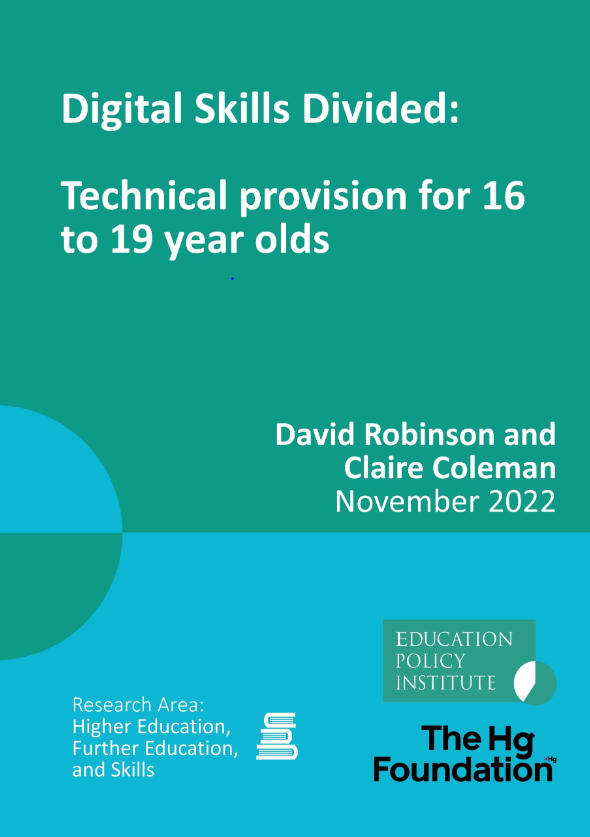EPI’s report highlights a growing demand for digital skills within the job market that’s not being met. A substantial 29% of vacancies reported as a result of skills shortages relate to a lack of digital skills, including 17% relating to a lack of advanced digital skills.
The report indicates that this unmet demand looks likely to worsen over the coming years, considering take-up of IT and computing courses at GCSE level has fallen by almost half (43%) since its peak in 2016. Curriculum reforms that led to the withdrawal of the IT GSCE, in favour of the less popular Computer Science GCSE, go some way to explaining this drop. Take-up of digital skills at this earlier stage of education strongly predicts take-up in the 16-19 phase.
The report also highlights a worrying and worsening gender divide, recommending that particular focus should be given to increasing the proportion of female students studying digital skills. Concerningly, this has reduced from 23% in 2012 to just 17% in 2020. The importance of enabling and encouraging more female students to pursue digital qualifications can’t be overstated. If the entry rate for female students were equal to that of male students, entries into intermediate-level digital qualifications would return to their previous peak.
As with the uptake of digital skills at GCSE, the report highlights that apprenticeship starts within the ICT sector have also fallen dramatically since their 2015/2016 peak, with 50% fewer starts in 2019/2020 and 66% fewer in 2021/2022. Though the rollout of three digital T levels may provide a quality option for many students, almost a quarter of students taking existing digital skills qualifications wouldn’t have the GCSE grades expected to access the new qualifications. If neither apprenticeships or T levels are positioned to facilitate greater uptake of digital skills amongst learners, many otherwise interested students are likely to instead pursue lower-level courses or be dissuaded from pursuing digital skills entirely.
Colleges are also facing serious issues which impact their ability to deliver digital skills training. Given the sought-after nature of digital roles within industry, attracting and retaining skilled digital teachers in colleges is extremely difficult. Two thirds of colleges reported that they find digital teachers difficult to recruit, with recent surveys indicating nearly half of digital teachers were likely to leave their roles in the next 12 months. The average salary of an ICT teacher in FE (which includes those with many years’ service) is £32,400 – an average ICT graduate salary is £34,700, with the potential to earn considerably more in their later career. Evidence also suggests colleges are at a disadvantage compared to schools, with an 11 percent pay gap between the sectors. Greater support for college provision of digital skills training will be necessary to underpin any drive to increase digital skills within the workforce.
Without securing a healthy pipeline of digital skills entering the workforce, digital skills shortages will increasingly plague the UK employment market, dampening economic growth. Ensuring that digital qualifications are attractive and accessible options for all learners would create valuable opportunities for prospective employees and relief for those employers struggling to source digital skills.
The full report can be accessed here:
Key Findings:
Unmet employer demand for digital skills, but increased earnings for those that pursue digital qualifications
- One in 20 employers reported a vacancy due to skills shortages, with 29% of these relating to a lack of digital skills, including 17% which were due to a lack of advanced digital skills.
- Digital skills shortages were most commonly found within the information and communication sector (61%), the financial services sector (25%) and the business sector (21%).
- Regions worst impacted by digital skills shortages were the West Midlands (22%), the North East (21%) and London (21%).
- Taking an intermediate-level ICT qualification is associated with increased earnings by an employee’s late 20s.
Falling take-up of digital qualifications, with particularly low uptake levels among female students worsening
- One-third fewer 16–19-year-old students are pursuing digital technical qualifications since 2015, from 33,000 students to 22,000 students.
- GSCE IT or computing qualifications have declined in popularity by 43% since their peak in 2016; largely a result of the withdrawal of the IT GCSE in favour of the computer science GCSE.
- A significant gender divide in the uptake of digital qualifications persists, with male 16–19-year-olds five times more likely to take a digital qualification than their female counterparts. The proportion of students taking these qualifications who are female fell from 23% in 2012 to just 17% in 2020.
- Almost two in five recent students pursuing digital skills took qualifications that may be defunded due to their overlap with digital T levels.
- However, 27% of these students were either studying smaller digital qualifications than T levels or do not meet the expected GCSE grade requirements to access T levels.
Colleges’ capacity to deliver digital qualifications at risk
- Almost one in five digital teachers are not qualified to teach level 3 qualifications and one-third have no industry experience.
- Two thirds of colleges find digital teachers difficult to recruit and a pre-pandemic survey revealed that almost half of digital teachers are likely to leave their roles within the next 12 months.
- Young people with digital qualifications generally earn more than graduates in other subject areas, suggesting employer recruitment into the profession suffers due to competition with more lucrative job offers.
Recommendations
- Proposal 1: The government must update their digital strategy with a clear set of proposals to increase entries into technical qualifications from young women. For example, through careers advice and guidance or through targeted work placements.
- Proposal 2: The government must increase incentives to encourage the greater recruitment of digital skills teachers, and of teachers in other subjects with significant shortages across the further education sector. As a starting point the levelling up premium payments should be extended to teachers in the Further Education sector.
- Proposal 3: The government must make the FE workforce data available to researchers soon after the first full year of the data collection. Given the apparent level of severe staffing difficulties in the FE sector this data is needed urgently to inform delivery and policy making.
- Proposal 4: The government must ensure that the introduction of T levels does not decrease the proportion of 16-19-year-olds taking level 3 qualification in digital skills. For example, by continuing the availability of alternative level 3 qualifications at least until enough students are able to access T levels.
This report has been supported by The Hg Foundation.

The Hg Foundation aims to widen access to high quality careers in technology, focussing on removing barriers to education and skills. It seeks to support groups currently underrepresented in the technology sector, including those from lower income backgrounds, from certain ethnic groups and women and girls. Hg, Europe’s leading software and technology services investor, supports the Foundation, enabling access to a network of skills and expertise in technology, as well as a portfolio of technology companies, providing access to work experience and mentoring. The foundation supports programmes in the UK, US and Europe.
The Foundation commissioned this research to better understand the challenges facing young people pursuing technical digital qualifications – and facing colleges in providing these pathways. The results will inform the Foundation’s future work in the UK and others working in this space, as well as informing policymakers looking to address the digital skills shortage.


